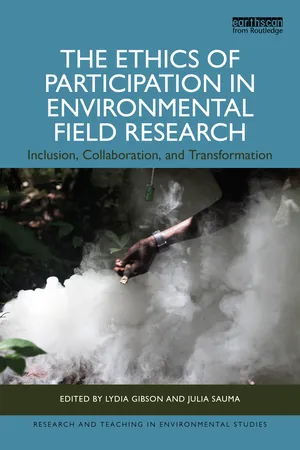
The Ethics of Participation in Environmental Field Research
Inclusion, Collaboration, and Transformation
- English
- ePUB (mobile friendly)
- Available on iOS & Android
The Ethics of Participation in Environmental Field Research
Inclusion, Collaboration, and Transformation
About this book
Local participation is increasingly seen as a central and ethical part of environmental research. As such, many environmental efforts are becoming increasingly participatory. Participation, as a string of literature has shown, has many political, economic, social, and epistemic consequences, and ethics is fluid, polyvalent, and contextual. 'Right is right, wrong is wrong' is dangerous rhetoric that centres western experiences and forecloses the myriad realities and relations bundled within and forced upon marginalised experiences. Both participation and ethics – as concepts and praxis – cast decades-long shadows over field research (particularly in anthropology), yet much of these discussions are left at the threshold of interdisciplinary spaces, where participation, traditional and Indigenous knowledge, and co-production are brought in to sanitise and legitimise environmental actions. Where are our lessons learned and what ought we to make of their absence? The first half of this volume offers ethnographic examples that allow us to begin to ask whether participation (in the capitalist machinery and colonial legacies of academic knowledge) is ever even ethical. The second half of the book is dedicated to anti-solutions: refusals to define problems and approaches in fixed, closed terms from which equations, calculations, and solutions can be derived.
This book provokes important new discussions about ethical participation in environmental field research by bringing to the fore the fluid nature of both ethics and participation. The volume aims to provide critical intervention for students and researchers across natural and social sciences whose fieldwork includes engagement with local communities and stakeholders, as well as conservation policymakers and practitioners who consult and work with local communities.
Frequently asked questions
- Essential is ideal for learners and professionals who enjoy exploring a wide range of subjects. Access the Essential Library with 800,000+ trusted titles and best-sellers across business, personal growth, and the humanities. Includes unlimited reading time and Standard Read Aloud voice.
- Complete: Perfect for advanced learners and researchers needing full, unrestricted access. Unlock 1.4M+ books across hundreds of subjects, including academic and specialized titles. The Complete Plan also includes advanced features like Premium Read Aloud and Research Assistant.
Please note we cannot support devices running on iOS 13 and Android 7 or earlier. Learn more about using the app.
Information
Table of contents
- Cover
- Endorsements
- Half Title
- Series Page
- Title Page
- Copyright Page
- Table of Contents
- List of boxes
- Notes on contributors
- Acknowledgements
- PART I Anthropological perspectives on environmental fieldwork ethics
- PART II Ethnographic instances: Thick descriptions of the ethical issues
- PART III Workshopping the problem: Interviews with environmental anthropologists and interdisciplinary scholars
- Index